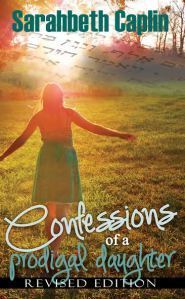Sarahbeth Caplin's Blog, page 56
September 12, 2014
In defense of doubt
There’s a lot about my Christian faith that I don’t understand. I can’t conceive of a loving God allowing his children to suffer in hell for eternity because they never heard of Jesus, were repulsed by the actions of those who claimed to represent Jesus, or just didn’t find substantial evidence to back up God’s existence.
I don’t fully understand prayer. Is it about changing myself, or getting what I want? If I ask God for something and don’t get it, isn’t that treating him like a genie? If God already has a plan mapped out, is prayer supposed to change his mind?
And that’s just the beginning of my laundry list of questions. Why bother calling myself a Christian at all, then?
Because there’s something inherently attractive about a religion where God came to meet us, rather than requiring humans to work their way up a moral ladder (provided you already believe a God exists).
Because Jesus said to love our enemies. As much as I find that notion ridiculous, I also find it fascinating and want to learn more.
But of everything else about Christianity that’s complicated, this obligation to “share my faith” is especially puzzling.
I know what it’s like to be on the receiving end of a polished, rehearsed, and coldly delivered “faith pitch” that utterly lacks sincerity and a desire to know the person you’re speaking to. I’ve resolved never to speak about my beliefs like that. Because if what you believe makes up who you are, it’s something that will eventually uncover itself when you talk to people. When you love someone, you make him or her known. It’s something we do without realizing it, when that kind of devotion is so tightly woven into our lives. And people notice a difference.
My goal has always to strive for authenticity. I fumble and stumble around for honest answers, not theological constructs. I try to make a point of asking, “What are your beliefs, if you’re comfortable sharing?”
I don’t try and hide the fact that I struggle. I envy the Christians who seem to have it all figured out, who calmly state that the answers to all their questions were found in the very same verses that give me trouble. I’ve wondered if there’s something wrong with me for not being as persuasive as they are.
But I think there’s something inspiring about the persistence to understand something that’s bigger than us. There are plenty of times when this faith thing seems like a fool’s errand, and maybe it is. I wonder sometimes if maybe that’s the point. If a spiritual realm exists, it’s impossible to think we can fully understand it using the resources of a material world.
There’s something more inviting about a person who says, “I’m on a journey to find wisdom, wanna join?” as opposed to “My beliefs are solid and unchangeable, here’s why.”
My fear is having a small, easily shakable faith that falls apart by asking a single question, losing a certain debate, or reading a particular book. But to only surround myself with other Christians, only read Christian books, only listen to Christian music…I fear that even more.
When I flip through my Bible, I see beauty in the verses that provide hope to people lying in hospital beds, courage to men and women on the battlefield. But I also look through the Bible and see horror: verses that have been used to justify the worst crimes against humanity, the most dangerous kinds of intolerance.
I’ve been the accuser of heresy before. I’ve also been the one accused. But in reality, all of us are both.


September 10, 2014
“Fear your perceived enemies and drive them out of your country,” said Jesus never
In addition to Sunday School and Bat Mitzvah training, my Jewish childhood was spotted with history lessons about the Holocaust. My bookshelves held the typical ‘90s girlhood titles, like The Babysitter’s Club series, plus The Diary of Anne Frank and Elie Wiesel’s Night. I read the latter two while still in elementary school. “Never Forget” was one of the biggest lessons I took from my Jewish education. It’s the refrain that helped shape the activist I am today.
What’s more horrifying to me than the photographic evidence of emaciated bodies from starvation, and testimonies of unspeakable torture, is the thought of entire countries turning their backs to the suffering of innocents; of ordinary people with families and children of their own being so quick to believe stereotypes and outright lies from the soapbox of a powerful, charismatic leader. It’s not just that Hitler was so engaging with the public and a gifted speaker: he provided a convenient scapegoat for a nation that was already fearful and paranoid about its future.
Why am I talking about this? Because fear and paranoia is what I’m seeing more of lately, pertaining to Muslims and their “infiltration” of America. The fear of ISIS and what its members are capable of is more than valid, but since that’s happening “over there” in the Middle Eats, what can be done about it from here in the States? How about blaming all Muslims and advocate driving them out, as advocated in an editorial from Charisma News, written by a preacher named Gary Cass (that editorial has, mercifully, been taken down after a mass outrage on Twitter)? Yeah, that’s an ideal “solution.”
This should sound dangerously familiar!
I made the mistake of reading some of the comments on the original article. There are plenty of people calling themselves “Christian” who agree with him. Your skin should start to crawl now.
As someone who was raised with awareness of what fear can do, we cannot allow this fear to shape our view of all Muslims. This is how the fires of history’s most tragic persecutions and genocides get started.
I’m sad that this needs to be pointed out. I’m sad that this lesson bears repeating. But the anti-Muslim vitriol I’m seeing posted on Facebook and Twitter, some of it coming from my brothers and sisters in Christ, makes it necessary. I have to wonder if many of them have ever met a practicing Muslim before. Where are they getting their lessons from? The media? Or from flesh-and-blood people who practice Islam?
Christians: remember that we get it wrong, too. Our history is stained by inquisitions, witch burnings, and persecutions. Today, we insist those held responsible weren’t really followers of Jesus; they were followers of some other agenda. So why are we so quick to paint all Muslims as terrorists?
I’ve seen plenty of posts advocating grace for abusive preachers like Mark Driscoll, whose hateful, misogynistic views on women and homosexuals have sunk his ministry. I’ve seen posts that are quick to point out “That’s not what Jesus would do” when the Westboro Baptists picket another funeral with their angry “God Hates Fags” signs. Our Muslims neighbors should be shown the same grace.
Please, do not let your fear get in the way of your good judgment. Do not let your paranoia get in the way of considering “what Jesus would do.”
“You shall fear your perceived enemies and drive them out of your country” is something Jesus never said.


September 5, 2014
From ‘sex positive’ to ‘willingly oppressed': a gradual assimilation
It happens so often it’s sadly predictable: every new Disney kid grows up to be a raunchy pop star.
Well, I say “raunchy.” Others might say “sexually empowered.”
But did you know that majority of explicit songs on Ariana Grande’s new album – songs that ask men to prove themselves sexually in order to date her, songs about staying with men (some verbally abusive) who cheat because it’s better than having no man at all – were written by men?
I don’t know if that’s relevant. It just seemed worth mentioning.
Because the above link comes from Wikipedia, it stands to reason that some sources may be listed incorrectly. Still, that’s an overwhelming number of male influences who, I’m going to assume, are probably older than Ariana, who is in her early twenties.
I don’t know about you, but I’m slightly creeped out by that.
Just forget, for one moment, that Ariana chooses to sing these songs. While that may be enough to satisfy the sex-positive crowd, it still disturbs me that this is part of the package of cementing the transition from Child Star to Adult Artist. And we, the listeners, may never know if it creeps Ariana out to sing this stuff, or if she ever gives it a second thought because it’s propelling her to stardom. It’s paying her bills. It’s making her an idol.
More than that, it pains me to know that there are people out there, men and women, who will say this is all perfectly fine. Feminists, too. We are declaring war on rape culture, on campuses that don’t take assaults seriously, on people who insist she ‘asked for it’ because her skirt was short and revealing, but we call material like this “empowering” simply because Ariana chooses to sing it. No one is forcing her to open her mouth for these lyrics – lyrics that romanticize verbal abuse and shitty behavior (from the song “Why Try”: “I’m loving the pain/ … Even when you’re yelling at me/I still think you’re beautiful”).
We’ve gone from trying to free women from oppression to celebrating women who glamorize oppression, simply because it’s their choice to do so? Am I the only one who sees a dangerous progression of assimilation here?
I call bullshit. Women deserve better than this. If feminism today is celebrating someone who is willingly oppressed, we have failed miserably. And don’t try to convince me for a second that a song about “loving pain” from an abusive partner is anything but oppression.


September 3, 2014
“My client pleads ‘not guilty’ because he doesn’t know what ‘assault’ is”
Many people have blogged about why it should be considered a sex crime, NOT a scandal, to steal someone’s nude photos and put them on the internet without their consent. I wholeheartedly agree, and don’t have much more to add. But what I’m curious about is the mindset of the hacker(s) and others like him/her: people, possibly sociopaths, who live with a dangerous sense of entitlement to others’ bodies and don’t consider themselves predators for misusing them.
Against my better judgment, I’ve read several tweets and article comments that clearly demonstrate we, as a society, don’t have a clear understanding of what a “sex crime” is. Of all the possible crimes that cause direct harm to a victim, we still have this idea that assault victims play a role in their victimization. She chose to take nude photos of herself and store them in her phone. She chose to put on a revealing outfit and go clubbing. Yet we don’t criticize someone nearly as much for hiding a spare key under their welcome mat and finding their home burglarized.
The average person who thinks nothing of looking at a stolen photo of a naked celebrity, or having sex with someone who’s too drunk to consent, may claim ignorance and plead “This is what guys do.” I, however, think they are more cunning than that. I think in cases like these, the foreknowledge that a victim will be held responsible is a prime motivator for would-be assailants. They are well aware of the stereotype that having an X and Y chromosome makes one a perv by default, and they use this to their advantage.
But is there a slim chance that some men are truly ignorant about the definition of assault? This is an idea I want to research for my next book:
Adelaide Scott, esteemed romance columnist for Stunning! Magazine, is smitten with her new boyfriend, Jordan Johnson…until one of his ex girlfriends accuses him of something unthinkable.
To prove his innocence, Jordan gives Addie a list of all his former girlfriends to ‘interview': to prove he’s the good man he claims to be.
Addie will find out the truth…but it’s nothing like she expected.
It may sound crazy, but this I didn’t know it was wrong! behavior is the most common form of sexual assault, and it deserves to be explored.


September 1, 2014
Why I Write About Rape
When I was a sophomore in college, I met a girl I’ll call Megan. I met her through a guy who asked me out on a date–a date that crashed and burned when it became clear he wanted more to happen that night than dinner and a romantic comedy. Megan told me later on that this boy had assaulted her one night at a party; I refused to believe her. Why? Because she and this boy were part of a bigger circle of friends who ate lunch together daily, in the same booth, in the campus dining hall. At the time, I couldn’t fathom how or why she could stand to be around him if what she said was true. In my mind, she was not acting like I thought a “true victim” should.
In one act of terrible judgment, I told her what I thought of the situation. Needless to say, we are no longer friends. Two years later, after ending my own abusive relationship, I realized how wrong I was to judge her. The same accusations I made toward her–Why do you still hang out with him? Why haven’t you pressed charges?–were the same questions I would face from some of my own friends. It was then that I realized the dynamic of abusive relationships and sexual abuse, in general, is far more complex than we realize.
Because sexual abuse is such a complex, personal topic, I understand that not everyone will agree with my conclusions about what “counts,” or how victims “should act.” That’s okay; what really matters is that we are willing to suspend our judgments long enough to give people a chance to be heard.
For all I know, acting like nothing had changed was Megan’s way of deflecting the severity of what had happened to her. Maybe she was afraid of not being believed, of putting her friends through the stress of having to choose sides. Maybe that boy threatened her with more violence if she told. All or none of these possibilities could be true–if not for Megan, then certainly for scores of other women.
There are many things I could say about how to act (or how not to act) toward someone who has experienced abuse, but every person’s story is different, and every person will respond in his or her own way. One fact remains true: rape and sexual assault are some of the most underreported crimes in America, if not the world. Many perpetrators of these atrocities never see a day in court, or the inside of a prison cell. This is largely because shame and social stigmas prevent people from coming forward.
Not knowing how to define abuse for myself, I kept away from words like “victim” and “survivor.” But to live productively in a world full of judgment and condemnation, continuing to forge healthy relationships despite dealing with lingering damage, is indeed surviving something.
Excerpted from Someone You Already Know


August 29, 2014
Defining Your Writing Career
Today’s Indie Author Life post is featured on Pubslush! Here’s a sample:
People sometimes ask me, “What was the defining moment in your writing career when things really started taking off?”
First, I appreciate the use of the term “writing career” and not “writing hobby” (that’s not sarcasm). For the longest time, it felt like a hobby, and I treated it as one by assuming no one would ever read my work besides myself, and close friends.
Over time, I started thinking more like a businessperson. To begin, I created my own domain: sbethcaplin.com. I also narrowed down my “pitch” for people who ask what exactly what I do for a living. It’s not enough to simply say “writer,” as this is very general and non-specific. My response now is brief but to the point: “I’m an independent author of young adult fiction, memoir, and poetry. I write about difficult social issues such as abuse, feminism, and religion, with guides for book club discussion in the back.” When you know who your target audience is, you will know who best to direct your pitch. For me, that includes women’s groups and churches.
I’m more on my way to a “writing career” today than I was six months ago, but I don’t think there’s any one technique or particular moment when I suddenly went from hobby writing to Career Writing. I’ve asked other authors this question, and they mostly agree: a writing career happens over a series of publications, marketing decisions, and just plain shooting in the dark, hoping something works. If there was one foolproof method out there for authors to get noticed and make money, we’d all be using it. You can only keep trying new things and stick to something that works for you.


August 19, 2014
When anxiety becomes a way of life
Have you ever had a moment when you wondered if you were meant to see something, or run into someone, at a very critical moment?
That’s what happened to me this afternoon. The following bumper sticker seemed to be screaming READ ME, SB! in the parking lot of the public library: “Eat right, exercise regularly, die anyway…So enjoy!”
Gotta love those backhanded inspirational quotes. It was meant to be silly, but it still got me thinking.
Outside of medication and therapy, what more is there to do about daily anxiety? I know worrying solves nothing. But the act of turning my thoughts elsewhere, to forcing myself to dwell on the positive, is like trying to run while stuck in a bowl of jello.
On the days when I feel like the writer of Ecclesiastes, who famously states “There is nothing new under the sun, everything is meaningless,” I try to remember the following things:
My stories may not be perfect, I may never get to a place of success that I dream about…but a handful of people told me they enjoyed them, so they aren’t meaningless.
I’m a deeply flawed person, I may have pissed off a great deal of people in my short lifetime…but I also have a handful of loyal, encouraging people in my life, and they are enough.
Few things go the way I think they should, the way they do for a lot of people I can’t help but envy…people who seem to get through life with the expected bumps and bruises, but no major traumas – the kind that emotionally paralyze you. People who had relationships that didn’t work out, but none that blew up in flames. People for whom many good things seem to come easily.
For every time I’m tempted to mourn anything that seems unfair, I think, Why should life be fair? This doesn’t make me feel better, necessarily, but it gives me some perspective. To mourn unfairness is to hold myself up as someone who is too good to struggle, too privileged to experience hardship.
Funny, all my favorite characters in books are ones who struggled in some way. I have zero interest in reading books about perfect people. Why should my life be any exception?
I can only do so much. That’s much better than the bare minimum.
Depression and anxiety make it hard to see the world as a beautiful place, but that doesn’t mean there aren’t pockets of beauty that exist somewhere.
My best moments of clarity often come through random acts of self-care: a hot cup of coffee while sitting on the porch, a purring kitty on my lap while reading a timeless novel.
If all your immediate needs are met in this particular moment, accept that that’s the best you can do. And that, for now, it’s enough.


August 17, 2014
No, I’m not calling Jesus a liar: Christians and responses to depression
During my one-year stint as a counseling major at seminary, I’ll never forget the first day of my last semester. The professor asked the class to stand up, and if you believed it was a sin to have depression, move to the left side of the classroom. If you believed it wasn’t a sin, move to the right.
My stomach clenched instantly, even though everyone in the class moved to the right side of the classroom.
All but one person.
Naturally, the professor called this person out, asking her to explain and defend her position. The woman looked to be around my mother’s age, and her response was a single statement: “If you have the true joy of Christ, you would never have an excuse to be depressed.”
That same semester, I joined a club exclusively for writers. The Subject du Jour of that group just happened to be sexual abuse, as most of us were either survivors or closely affiliated with one. Writing was our way of processing its heavy toll. But, again, there was one person who stood out by saying, “Why are we spending so much time talking and writing about this, when we could be writing about healing?”
“Writing is healing,” I explained to her (with an extraordinary amount of self-control).
“No,” she insisted. “Jesus is healing.”
“Writing can be a gift from Jesus to help with healing,” we pointed out, but the woman held her ground: “What are you saying about the power of Jesus, then? That he isn’t enough? Are you calling him a liar?”
That, right there, is one of a myriad of reasons I could no longer stay at seminary; why I could no longer affiliate with certain church groups. I didn’t have the words to explain myself back then (I only had blinding rage) but I have a few words now I’d like to say in response.
Joy may be a by-product of a relationship with Jesus, but it’s not a requirement.
Some of the most influential leaders in the Bible struggled with depression. How can we forget Psalm 44:24, when David cries, “Do you forget me, Lord? Why do you hide your gave from me?” Or Jesus himself taking time to be alone and weep when death was imminent? What about history’s numerous martyrs – what’s more depressing than being burned alive?!
Deeply-held convictions don’t have to be swayed by what the body feels. Strained relationships don’t equal broken relationships. If you’ve ever loved someone when they weren’t acting very lovable, you understand what this means.
For some people, depression is a chemical imbalance in the brain that must be treated like any other illness. For others, it’s triggered by tragic circumstances.
I don’t know if there’s a chemical imbalance in my brain or not. But I know that depression has woven its way into my life from watching a loved one die of cancer and experiencing an abusive relationship that lasted from the end of high school through college. My biggest concern is that I’m pressing on toward healing rather than choosing to remain stuck. I accept that this could be a life-long process. What is sinful about a person recognizing that they have a problem and choosing to seek help? What part of living in a broken world tells us that healing must be immediate?
Most importantly,
If you self-righteously judge the quality of my faith by my struggle with depression, you will not motivate me to get better. You will only enable me in staying stuck.
True, no one can make me do anything. I always have the choice to choose bitterness or betterness. It’s the motivation to choose betterness that evaporates when Christians tell me I have weak faith, instead of encouraging me and asking what they can do to help.
Aren’t Christians supposed to work together as a community? Don’t we all have unique spiritual gifts? Why does it never occur to some Christians that the answer to our prayers for healing could be found in each other? There are people with the ability to prescribe medication that can help manage chemical imbalances; there are people with an ability to just sit and listen, and communicate more love and empathy in a hug, a smile, or a nod than others try to do with a thousand verses pulled out of context.
Shame is a motivator for nothing but locking the gates of a self-made prison.


August 14, 2014
Finding success as a writer: the little victories add up
I haven’t dropped my goal of becoming a bestselling author (whatever that even means), but I did get realistic and made a list of smaller, much more doable goals in the meantime. Not making it onto a USA Today or NYT book list doesn’t equate to failure. Every Big Victory is made up of smaller victories:
Victory #1: Publishing the book
Before even getting to the sales part, that’s the first big step! Not everyone who finishes a book gets to the publishing part: it’s daunting and a lot like that recurring dream of showing up to take your math test naked. It’s vulnerable and brave to put yourself out there to be read and critiqued, so good job!
Victory #2: People are buying the book
This counts, even if your only customers are friends and family (so far). Your friends have other friends who are not your friends. Don’t discredit the power of word of mouth. I’m a huge evangelist for books that have a strong impact on me.
I’ve read some rants from authors about low sales during some months, but I’m just glad I sell any books at all…although I admit, I was REALLY excited when I sold 22 books in June, and a little crushed when I only sold seven in July. But still, any sales at all are always better than none. Always.
Victory #3: Getting reviews
Maybe your reviews will come from friends and family in the beginning. But still! Reviews help future readers who are browsing and looking at your book. Considering the number of people who say, “Yeah, I’ll get to it” when asked to write a review but never actually do, consider any review you get to be a victory, because it is. Even a small number of reviews are better than none!
But sometimes even one extremely heartfelt review is a huge victory. The first review that ever made me cry was from someone on Goodreads who said my book Someone You Already Know helped her in her healing process as a survivor of rape. That meant a lot. That keeps me writing.
Victory #4: 1-star reviews
Yes, I’m serious. My first instinct after reading my first 1-star for Public Displays of Convention was to blast “Mean” by Taylor Swift on repeat, but then I realized: 1-star reviews are proof to readers that someone other than your mom has read your book. That’s a big deal.
Victory #5: Building up a readership
In the two years I’ve been publishing books, it was only 10 months ago that I heard that buzz-phrase “build a readership.” So I got a Twitter account, a Facebook business page, created this blog, and started setting aside more time to engage with people who have similar interests. If people whom you’ve never met offline are starting to hear about you, whether it’s ten or ten thousand, that’s still a victory: people know you exist, and even if they don’t buy your books, at least they’ll know your books exist, too.
This non-exhaustive list feels small compared to the success of other indies I know, but I made it because I compare myself to others constantly: that’s a death trap. This list helps me remind myself that every big name in publishing started where I am right now. However you define “success,” remember it comes from a bunch of little things all rolled together over time.
Read other posts in the Indie Author Life series, and check back next week for more.


August 12, 2014
That one time I was assumed to be a “Cradle Christian”
My days of trying to fit in with my college ministry can best be described as a fish learning to fly. I was making friends, but I also felt extremely inadequate, surrounded by Christians who had been Christians since diapers. Outside of that, when I met new people who knew nothing of my past, the cross necklace I wore gave the impression that I was a “cradle Christian” as well.
That’s not wrong or anything. It just bothered me because that isn’t me at all: I’m not and probably never will be someone who fits the curious, cultural Christian ‘normal.’
I’ll never forget my first day of Sociology class my junior year, and the odd series of events that happened after that. I arrived a few minutes early, so after selecting a seat at the back of the auditorium, I quietly read my bible. Soon I was interrupted by a tap on my shoulder and a voice that chirped, “Whatcha readin’?”
This intrusion by a complete stranger felt rude and startling. Upon turning around, I’m embarrassed to say my annoyance quickly evaporated when I saw that the person who interrupted me was a guy, and he happened to be quite attractive. From the get-go, he assumed I was one of those nerdy Jesus Freaks. He nicknamed me “Christian Nerd,” which eventually got shortened to just “Nerd.” I couldn’t come up with any clever nicknames for him so I just called him by his given name: Ryan.
Every day he would sit next to me, and every day he would greet me with, “What’s up, Nerd? Save any souls lately?” I always brushed him off, but was oddly flattered that my spiritual devotion was recognized in such a way that didn’t make him want to run in the opposite direction. When I used to tell people I wanted to be a rabbi, one of two things would happen next: they would be very interested and want to know more, or wonder what planet I just landed from.
Ryan seemed to have me all figured out within the first week of class. He thought I was from a family of devout Christian Republicans who home-schooled me, forbid me to wear makeup, listen to secular music, go on dates, or see any movie rated higher than PG.
I didn’t have the heart to tell him I was descended from a long line of liberal Jews who always voted Democrat, drank, cursed, and believed the only unforgiveable sin was rooting against the New York Yankees.
He was funny at first, but the constant heckling about my apparent prude-like ways was starting to get old fast.
Then one day he asked for my number, which led to asking me out for lunch after class. I let his good looks get in the way of my good judgment by saying yes.
Meeting for lunch at Wendy’s after class became a tradition, until one day he informed me that, while I was cute and all, he didn’t see me as a potential girlfriend because I was…wait for it…too Christian for him.
From “too Jewish” for Simon at Hillel to “too Christian” for Ryan in the span of a single year. Go figure.
Excerpted from Confessions of a Prodigal Daughter












